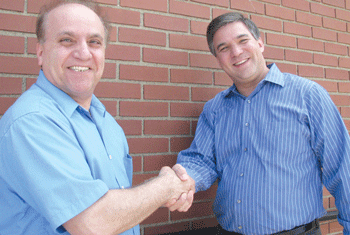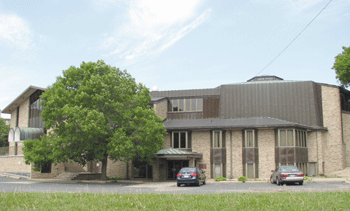St. Louis Park shul closes; members will join Adath Jeshurun
By MORDECAI SPECKTOR
Adeel Saad, president of Bnai Emet Synagogue, says, “I’m using the word ‘bittersweet.’ I’m using the word over and over and over.”
The bittersweet moment for Saad and others comes this weekend, when Bnai Emet Synagogue in St. Louis Park holds its final Shabbat services. The activities scheduled for June 24-26 are on the theme “Bnai Emet B’Ahavah (Bnai Emet with Love).” In the face of dwindling membership, the shul decided last year to close and merge with another congregation.
Transitions
On June 2, the congregation approved a proposal by its board of trustees to join Adath Jeshurun Congregation in Minnetonka. Saad expects that most of the 250 Bnai Emet members will join the much larger Conservative synagogue.
“I’m saddened that we are closing a chapter, but I am so excited and so pleased that we are moving to Adath,” Saad comments. He mentions that there will be new programs and expanded “opportunities in a larger synagogue” for former Bnai Emet members.
“At the same time, I’m very saddened to be that individual that’s going to say, ‘Okay, now we’re closing it up.’ You are closing a big chapter of history,” notes Saad.
Saad and Mike Greenstein, president of Adath Jeshurun Congregation, met with the AJW last week. The interview took place in Saad’s office at Luggage World, his retail business in St. Louis Park.
 Adeel Saad (left), Bnai Emet Synagogue president, has forged a friendship with Mike Greenstein, president of Adath Jeshurun Congregation. (Photos: Mordecai Specktor)
Adeel Saad (left), Bnai Emet Synagogue president, has forged a friendship with Mike Greenstein, president of Adath Jeshurun Congregation. (Photos: Mordecai Specktor)
Bnai Emet is a congregation formed in 1971, of three former congregations: Mikro Kodesh, Tifereth B’nai Jacob, both North Minneapolis shuls, and B’nai Abraham, which began in 1891, in South Minneapolis. Adath Jeshurun also has its roots in South Minneapolis, so the blending with Bnai Emet represents another aspect of the migration of Minneapolis-area Jews from the city to the suburbs.
“The wonderful thing about joining Adath Jeshurun is that they understand that while it is Bnai Emet which is closing, it is a loss to the community at large. They see this as an opportunity to preserve a part of Minneapolis’ Jewish history. It really is a ‘win-win’ situation,” said Rabbi Charni Flame Selch, the last in a line of Bnai Emet spiritual leaders that includes Rabbis Sylvan Kamens, Herbert Yoskowitz, Howard Siegel and David L. Abramson.
(Rabbi Marc Liebhaber, former publisher of the American Jewish World, was the rabbi of Mikro-Tifereth, the synagogue formed by the 1968 merger of Mikro Kodesh and Tifereth B’nai Jacob. He was joined on the bima by Cantor Shalom Markovitz.)
Rabbi Selch’s contract with Bnai Emet ends June 30, and she will be taking a new position on the East Coast, according to Saad.
Clergy and congregants at Adath Jeshurun are looking forward to welcoming scores of new members.
“We are deeply appreciative that the members of Bnai Emet have decided to entrust the legacy of their congregation to us at Adath,” said Rabbi Harold Kravitz, Adath Jeshurun’s senior rabbi. “We recognize how difficult a decision that was. We are committed to trying to ease this transition and to offering a warm welcome to all.”
Bnai Emet explored merging with a number of Twin Cities Conservative synagogues, according to Saad. “We talked to all the congregations, from the get-go,” Saad recalls.
Asked about the details of how one congregation merges with another, Saad defers to Mike Greenstein. “He’s my new president,” he says, as they both laugh.
“It’s really not a merger in the legal sense,” Greenstein responds. He explains that the “Bnai Emet entity will continue on,” until its obligations and financial assets have been resolved.
Ultimately, Bnai Emet congregants will make individual decisions about affiliating with a synagogue, says Greenstein. “In terms of the Bnai Emet entity, they have recommended that their congregants go to Adath, and they will transfer all their history to the Adath, and then it will be our collective decision… how we honor that legacy of Bnai Emet.”
Bnai Emet’s executive committee and board of trustees both “voted unanimously” to join with Adath Jeshurun, says Saad, who prefers to use the “more respectful” word “joining,” rather than “merging,” in describing the journey of Bnai Emet members to Adath Jeshurun, a congregation numbering 1,200.
“This isn’t about how do we increase membership,” Greenstein comments. “This is really about what we do for the full community, and how we’re able to help out fellow congregants.”
Greenstein says that Adath Jeshurun congregants are “very positive” about the new members coming into the fold.
“People are excited to welcome the new congregants,” he says. “We also share in the sadness. Bnai Emet has a rich and long history in this community, and it’s sad that they no longer will be an independent shul.”
Adath Jeshurun is looking forward to integrating its new members, who will serve on congregational committees and bring new energy to the synagogue, according to Greenstein. A two-day orientation in July for former Bnai Emet members is being planned, along with a special program as part of the annual picnic on Sept. 11.
Four new committees have been established at Adath Jeshurun to manage the transition for Bnai Emet members, deal with Bnai Emet’s assets, incorporate the St. Louis Park shul’s furnishings (Torah scrolls, artwork, Judaica), and welcome the new members.
 Bnai Emet will continue as a legal entity and a board of trustees will oversee the sale of its real estate on Highway 7 and Ottawa Avenue in St. Louis Park.
Bnai Emet will continue as a legal entity and a board of trustees will oversee the sale of its real estate on Highway 7 and Ottawa Avenue in St. Louis Park.
What will become of the Bnai Emet property, the building and land on Highway 7 and Ottawa Avenue?
Neil M. Meyer, of the Meyer and Njus law firm in Minneapolis, will chair the Bnai Emet board of trustees, the legal entity that will manage disposition of the synagogue’s assets beginning on July 1.
“All of the assets will remain in Bnai Emet, and that board will then vote on what it will do with those assets once they have all been converted to cash,” Meyer explains, and adds that the “intention” of Bnai Emet’s leadership is that the cash eventually will be donated to Adath Jeshurun, “which will continue to honor the restricted funds in Bnai Emet and will reserve funds to continue to honor the legacy that is Bnai Emet.”
There are three pieces of Bnai Emet real estate in St. Louis Park: the synagogue building, which sits on one and three-quarter acres; an additional quarter-acre parking lot across the street; and a small caretaker’s house and lot just north of the shul on Natchez Avenue. “It’s a little bit more than two and a quarter acres,” Meyer says.
This is prime real estate, just across the border from Minneapolis. What’s it worth?
Meyer says that he does not have a valuation; and, again, the board’s authority doesn’t arise until July 1.
“We’ve already had some expressions of interest in the property,” Meyer says, and adds that Bnai Emet also has a cemetery in Richfield. The Bnai Emet Cemetery is one of four Jewish cemeteries located on a plot of land on Penn Avenue S., between 70-1/2th and 72nd streets.
The Bnai Emet board of trustees eventually have to find someone to manage the cemetery on a long-term basis, according to Meyer.
Getting back to the St. Louis Park real estate, Saad and Greenstein said that they hoped that the Bnai Emet property stayed in the Jewish community.
“I think that it’s absolutely possible,” Meyer allows. “We need to have a very serious discussion about the priorities in dealing with this real estate. There are competing values here, too. Is the priority to realize the greatest value for the property? Is there a priority to try to keep it in the Jewish community, and if not in the Jewish community, then in a faith community?”
The Bnai Emet trustees will soon engage in a “thoughtful” discussion about what to do with their property, according to Meyer.
In the meantime, the celebration of Bnai Emet begins with a Kabbalat Shabbat service 8:15 Friday, June 24, followed by an oneg. Saturday’s 9 a.m. Shabbat morning service will include “some surprises,” according to the formal invitation; it will be followed by a Kiddush luncheon. At 7 p.m. Saturday evening, there will be a modified Melave Malka meal and Havdala, followed by a kumzits.
Bnai Emet will host an open house 2 p.m. Sunday, June 26, with the “B’ahava” program at 3 p.m. At approximately 4:30 p.m., a procession of cars will carry the Bnai Emet torah scrolls from the St. Louis Park synagogue to Adath Jeshurun.
“We want this to be a touching, celebratory weekend,” said Rabbi Selch. “But we’re also aware of how sad some people are with leaving this location. I’m optimistic that people will come to share stories, memories and hopes for the future. I know that this next step in the congregation’s journey will allow us a deeper sense of holiness and spirituality.”
***
For information about Bnai Emet’s farewell weekend, call Jeanne Kaufman, the program chair, at 763-533-1888 (e-mail: jeannekaufman@comcast.net).
(American Jewish World, 6.24.11)









 Adeel Saad (left), Bnai Emet Synagogue president, has forged a friendship with Mike Greenstein, president of Adath Jeshurun Congregation. (Photos: Mordecai Specktor)
Adeel Saad (left), Bnai Emet Synagogue president, has forged a friendship with Mike Greenstein, president of Adath Jeshurun Congregation. (Photos: Mordecai Specktor) Bnai Emet will continue as a legal entity and a board of trustees will oversee the sale of its real estate on Highway 7 and Ottawa Avenue in St. Louis Park.
Bnai Emet will continue as a legal entity and a board of trustees will oversee the sale of its real estate on Highway 7 and Ottawa Avenue in St. Louis Park.










My father used to play the organ at Bnai Abraham services, and I used to come with him. I will miss it. I hope the property is used by another synagogue. It is a precious resource for the community.
It is shameful and thoroughly inconceivable that the article made absolutely no mention of Rabbi Moshe Sachs, a towering figure amongst the great Twin Cities rabbis of the 50s, 60s & 70s, the rabbi of the core original shul on the current highway 7 site known by those of us of a not so distant time as Bnai Abraham. Has the collective memory of our once great shul gone into the dustbin of history? Inexcusable.